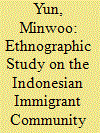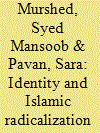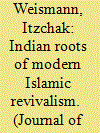|
|
|
Sort Order |
|
|
|
Items / Page
|
|
|
|
|
|
|
| Srl | Item |
| 1 |
ID:
164606


|
|
|
|
|
| Summary/Abstract |
Contrary to popular belief, South Korea is not immune from the growth of Islamic radicalism. Although no serious terrorist attack has yet occurred within the country, some worrisome incidents have been reported. Recently, an Indonesian man was arrested on the grounds that he publicly supported the Al Nusra Front, a known Al Qaeda–affiliated terrorist organization, and even attempted to depart for Syria to join the organization. The current study is a response to such an incident. It investigates whether such an incident is an isolated exception or a harbinger of the Islamic radicalization process within South Korea, particularly within the Muslim immigrant community. The current study focuses primarily on the Indonesian immigrant community within South Korea but also investigates other Muslim communities when needed, as Muslim immigrant communities are often intermingled and share similar features. The study found some worrisome developments of Islamic radicalization within the Indonesian immigrant community in particular and the Muslim immigrant community in general. Using the enculturation stress model, the current study explains that such Islamic radicalization is a pathway of the collective response to cultural adaptation stress that most Indonesian and other Muslim immigrants face within South Korea. To conduct the study, ethnographic qualitative interviews were used. Indonesian immigrants, their Korean spouses, civilian activists, civilian aid workers, government officials, police officers, immigrant agency officials, and security officials were contacted and interviewed. Each interview lasted between approximately one and four hours. The limitations of the study are also discussed.
|
|
|
|
|
|
|
|
|
|
|
|
|
|
|
|
| 2 |
ID:
107886


|
|
|
|
|
| Publication |
2011.
|
| Summary/Abstract |
This article argues that both socio-economic disadvantage and political factors, such as foreign policy of the West about the Muslim world, along with historical grievances, play a part in the development of Islamic radicalized collective action in Western Europe. We emphasize the role of group identity-based individual behaviour in organizing collective action within radicalized Muslim groups. Inasmuch as culture plays any role at all in radicalization, it is because individuals feel the imperative to act on the basis of their Muslim identity, something to which different individuals will attach varying degrees of salience, depending on how they place their Muslim identity-based actions in the scheme of their multiple identities. We also emphasize the role of the opportunistic politician, from the majority European community, in fomenting hatred for Muslims, which also produces a backlash from radicalized political Islam. We present comparative evidence of socio-economic, political and cultural disadvantage faced by Muslim minorities in five West European countries: Germany, the UK, France, Spain and the Netherlands.
|
|
|
|
|
|
|
|
|
|
|
|
|
|
|
|
| 3 |
ID:
123031


|
|
|
| 4 |
ID:
095118


|
|
|
|
|
| Publication |
2010.
|
| Summary/Abstract |
To what extent does Russia face the threat of Islamic radicalization? This article provides an assessment of the nature and severity of the threat and its changing dynamics from the Yeltsin to the Putin periods in post-Soviet Russia. It argues that, contrary to many accounts, the threat was at its greatest during the late 1990s and in the Yeltsin period. Moreover, the Putin administration adopted a series of policies that have had some significant successes in stemming the flow of Islamic radicalism within Russia. This has involved a policy mix, including repression and coercion, most notably in the military campaign in Chechnya; diplomatic efforts in the Middle East and broader Muslim world to improve Russia's image; pro-active domestic policies to co-opt and support moderate Russian Muslim leaders and their communities; and attempts to construct a national identity and ideology which supports the multi-confessional and multinational nature of the Russian state and recognizes the Muslim contribution to Russian statehood and nationality. Although these policies have had their successes, there are also significant limitations, the most notable of which is the failure to address the problems of poor governance in the North Caucasus, which has sustained the Islamist insurgency in the region. The failure to develop an intermediary Muslim civil society in Russia more generally also contributes to the continuing appeal of Islamist radicalism, particularly among younger Russian Muslims.
|
|
|
|
|
|
|
|
|
|
|
|
|
|
|
|
|
|
|
|
|